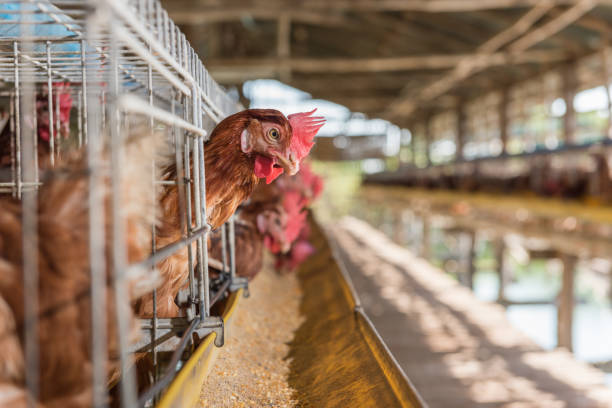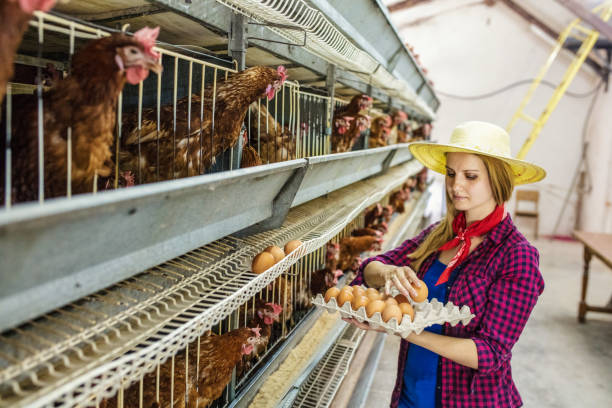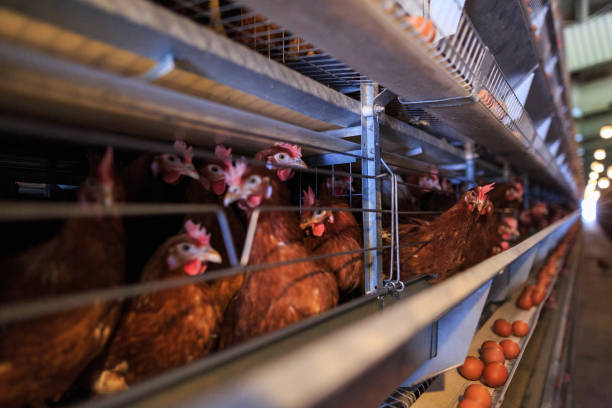
Battery Cage Solutions for Layer Farms in Uganda: Planning & Implementation
Battery Cage Solutions for Layer Farms in Uganda: Planning & Implementation
Uganda’s poultry industry is a cornerstone of its agricultural sector, providing a vital source of protein and income for countless families. Layer farming, in particular, plays a crucial role in meeting the growing demand for eggs. However, traditional farming methods often struggle to keep pace with this demand and present numerous challenges, from disease control to efficient feed management. This is where battery cage systems step in, offering a modern solution to boost productivity and streamline operations. While the term “battery cage” has sometimes faced negative connotations, modern implementations, particularly those offered by forward-thinking suppliers like Livi Machinery, prioritize bird welfare alongside efficiency. In this article, we’ll delve into the planning and implementation of battery cage solutions for layer farms across Uganda, focusing on the practical aspects, economic benefits, and considerations for animal welfare.
Understanding the Ugandan Layer Farming Landscape
Before diving into the specifics of battery cage systems, it’s essential to understand the unique context of the Ugandan layer farming landscape. Smallholder farmers dominate the sector, often operating on limited land and with restricted access to capital. Disease outbreaks, fluctuations in feed prices, and inadequate infrastructure pose significant hurdles. The climate, too, presents challenges, with periods of intense heat and humidity impacting bird health and productivity. Understanding these realities is crucial for tailoring battery cage solutions to meet the specific needs of Ugandan farmers.
Why Choose Battery Cage Systems? Addressing the Key Benefits
Battery cage systems offer a compelling alternative to traditional free-range or deep litter methods, especially when well-managed and designed with bird welfare in mind. The key benefits include:
Increased Egg Production: Battery cages optimize space utilization, allowing for a higher stocking density than other methods. This translates directly into more eggs produced per square meter of land. Modern cage designs, with proper ventilation and climate control, minimize stress on the birds, leading to improved laying rates.
Improved Disease Control: The separated environment in battery cages reduces the risk of disease transmission. Manure is collected and disposed of efficiently, minimizing the buildup of pathogens and parasites. This leads to healthier flocks and lower mortality rates, reducing the need for costly medications.
Efficient Feed Management: Battery cages allow for precise feed distribution, ensuring that each bird receives the correct amount of nutrients. This minimizes feed wastage and promotes optimal growth and egg production. Automated feeding systems further streamline this process, reducing labor costs.
Simplified Egg Collection: Eggs roll directly out of the cages and onto collection belts, eliminating the need to search for them in litter or nests. This saves time and labor and reduces the risk of egg breakage and contamination.
Better Manure Management: As mentioned previously, effective manure management is a huge advantage. The separation of birds and manure reduces ammonia buildup, improving air quality within the poultry house and minimizing environmental impact. Collected manure can also be processed into valuable fertilizer.
Enhanced Bird Welfare (When Implemented Correctly): While traditional battery cages have faced criticism, modern designs prioritize bird welfare. This includes providing adequate space per bird, comfortable flooring, access to water and feed, and proper ventilation and lighting. Selecting reputable suppliers like Livi Machinery, who are committed to ethical and humane farming practices, is crucial.
Planning Your Battery Cage System: A Step-by-Step Guide
Implementing a battery cage system is a significant investment, and careful planning is essential to ensure success. Here’s a step-by-step guide to help you get started:
Assess Your Current Situation:
Evaluate your existing infrastructure, including land availability, buildings, and utilities.
Determine your target market and the demand for eggs in your area.
Analyze your financial resources and secure funding if necessary.
Consult with local agricultural extension officers and poultry experts for advice.
Choose the Right Cage System:
Consider the size of your flock and your available space.
Select a cage system that meets your budget and operational requirements.
Look for durable, high-quality cages that are easy to clean and maintain.
Prioritize cage designs that prioritize bird welfare, such as those with comfortable flooring and adequate space. Consult with suppliers like Livi Machinery about the specifications of their cage systems.
Consider automated options for feeding, watering, and egg collection to further streamline operations.
Prepare Your Poultry House:

Ensure that your poultry house is well-ventilated and insulated to maintain a comfortable temperature for the birds.
Install proper lighting to stimulate egg production.
Provide adequate water and electricity supply.
Implement biosecurity measures to prevent disease outbreaks.
Source High-Quality Chicks:
Purchase chicks from a reputable hatchery that provides healthy, vaccinated birds.
Choose a breed that is well-suited to the Ugandan climate and market demands.
Implement a Feeding Program:
Develop a balanced feeding program that meets the nutritional needs of your laying hens.
Use high-quality feed ingredients and follow recommended feeding guidelines.
Ensure that birds have constant access to fresh water.
Manage Manure Effectively:
Implement a system for collecting and disposing of manure in an environmentally responsible manner.
Consider composting or using the manure as fertilizer.

Regularly clean the poultry house to maintain hygiene and prevent odor problems.

Monitor Bird Health and Productivity:
Regularly inspect your birds for signs of illness or stress.
Maintain accurate records of egg production, feed consumption, and mortality rates.
Consult with a veterinarian or poultry expert if you encounter any problems.
Working with Livi Machinery: A Partnership for Success
Choosing the right equipment supplier is crucial for the success of your battery cage system. Livi Machinery is a reputable supplier with extensive experience in providing poultry equipment to African countries. We offer a wide range of battery cage systems designed to meet the specific needs of Ugandan farmers.
Here’s how Livi Machinery can help you:
High-Quality Cages: Our cages are made from durable materials and are designed to withstand the harsh conditions of the Ugandan climate. We offer various cage configurations to suit different flock sizes and space constraints.
Automated Systems: We provide automated feeding, watering, and egg collection systems to streamline your operations and reduce labor costs.
Expert Advice: Our team of experienced poultry experts can provide guidance on all aspects of battery cage system implementation, from planning to management.
After-Sales Support: We offer comprehensive after-sales support, including installation, training, and maintenance services.
Commitment to Bird Welfare: We are committed to providing cage systems that prioritize bird welfare and promote ethical farming practices.
Addressing Concerns about Animal Welfare
It’s crucial to address concerns about animal welfare when considering battery cage systems. While older designs faced criticism, modern systems, particularly those offered by Livi Machinery, incorporate several features to improve the well-being of laying hens:
Increased Cage Space: Modern cages provide more space per bird than traditional designs, allowing for greater freedom of movement.
Comfortable Flooring: Many cages now feature padded or rubberized flooring to provide a more comfortable surface for the birds to stand on.
Improved Ventilation and Lighting: Modern poultry houses are equipped with advanced ventilation and lighting systems to create a comfortable and stimulating environment for the birds.
Opportunities for Natural Behaviors: Some cage systems incorporate features that allow birds to engage in natural behaviors such as perching, scratching, and dust bathing.
Responsible Management Practices: Proper management practices, such as providing adequate feed and water, monitoring bird health, and minimizing stress, are essential for ensuring animal welfare in battery cage systems.
It’s about responsible implementation. By choosing a reputable supplier like Livi Machinery and implementing best management practices, Ugandan farmers can utilize battery cage systems to improve productivity while ensuring the well-being of their laying hens. Education and training on bird handling techniques and welfare standards are also crucial.
Economic Considerations and Return on Investment
Investing in a battery cage system requires careful consideration of economic factors. While the initial investment may be higher than traditional farming methods, the long-term benefits can outweigh the costs. Increased egg production, reduced feed wastage, lower mortality rates, and reduced labor costs all contribute to a higher return on investment.
To calculate your potential return on investment, consider the following factors:
Initial Investment: This includes the cost of the cage system, poultry house modifications, and other equipment.
Operating Costs: This includes the cost of feed, chicks, labor, electricity, and water.
Egg Production: Estimate your expected egg production based on the breed of chicken and the efficiency of your system.
Egg Prices: Research the market prices for eggs in your area.
By carefully analyzing these factors, you can determine the feasibility of investing in a battery cage system and project your potential profits. Livi Machinery can assist you with these calculations, providing realistic projections based on our experience with similar projects.
Conclusion: A Sustainable Future for Ugandan Layer Farms
Battery cage systems offer a viable solution for increasing egg production, improving efficiency, and enhancing profitability for layer farms in Uganda. By carefully planning your system, choosing the right equipment supplier, and implementing best management practices, you can achieve a sustainable and successful poultry operation. Livi Machinery is committed to partnering with Ugandan farmers to provide the equipment, expertise, and support they need to thrive in the competitive egg market. We believe that with responsible implementation and a focus on animal welfare, battery cage systems can contribute to a more secure and sustainable food supply for Uganda. Ultimately, the choice to adopt a battery cage system rests on individual circumstances and priorities. However, with proper planning and a commitment to responsible farming practices, battery cages can offer a significant opportunity for growth and improvement in the Ugandan layer farming sector.
